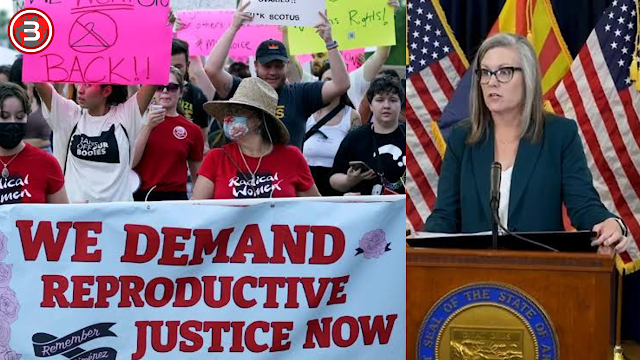Arizona has just made a major decision about abortion, and it's causing a lot of discussion and debate. Essentially, the state's highest court ruled that in almost all situations, abortion is not allowed, except when it's absolutely necessary to save the mother's life. This ruling is based on a very old law that goes back more than 100 years, back to a time when Arizona wasn't even officially a state yet!
Now, this decision is a big deal for a few reasons. Firstly, it's not entirely clear what exactly qualifies as a situation where the mother's life is in danger. This lack of clarity could make things really complicated for women who need medical help.
A lawyer named Misty Marris was really surprised by this decision. She couldn't believe that such an old law was used to make such an important ruling. On the other hand, Governor Katy Hobbs wants the state's lawmakers to step in and figure things out quickly. But whether they'll be able to do that remains to be seen.
This decision isn't just important for Arizona—it could also have a big impact on future elections. Some people are already working hard to change the rules and protect abortion rights in Arizona. And since Arizona is such an important state in politics, this decision could affect who gets elected in the future.
To understand the implications of this ruling, it's crucial to delve into its legal and historical context. The 1864 law cited by the court has lain dormant for generations, overshadowed by subsequent legislation and judicial precedents, including the landmark Roe v. Wade decision in 1973. However, with the recent wave of conservative appointments to the judiciary and mounting challenges to Roe v. Wade, Arizona's Supreme Court seized upon this obscure statute as the foundation for its ruling.
The decision has sparked intense debate among legal scholars, activists, and policymakers. Critics argue that it represents a regressive step that infringes upon women's reproductive rights and undermines the principle of bodily autonomy. They point to the lack of clarity surrounding the "life of the mother" exception and warn of the potential consequences for women's health and well-being.
On the other hand, proponents of the ruling contend that it reflects the will of the people and upholds the sanctity of life. They argue that abortion should be restricted except in cases of medical necessity, aligning with conservative values and religious beliefs prevalent in many parts of Arizona.
Amidst the swirling controversy, one cannot overlook the human impact of the ruling. For women facing unplanned pregnancies or medical complications, the decision represents a profound limitation on their ability to make choices about their own bodies and futures. The uncertainty surrounding the legality of abortion procedures further compounds their distress and adds layers of complexity to an already challenging situation.
Moreover, the ruling has broader implications for the healthcare system and legal framework in Arizona. Healthcare providers now find themselves navigating a maze of regulations and uncertainties, unsure of how to proceed in the absence of clear guidelines. The potential criminalization of abortion procedures adds another layer of complexity, raising questions about enforcement mechanisms and penalties for non-compliance.
In response to the ruling, activists and advocacy groups have mobilized to defend reproductive rights and push back against the restrictions imposed by the court. Efforts to enshrine abortion rights in the state constitution have gained momentum, with grassroots campaigns and signature drives underway to challenge the legality of the ruling and safeguard women's access to healthcare.
At the same time, political leaders and policymakers are grappling with the fallout from the ruling and the challenges it poses for governance and public policy. Governor Katy Hobbs's call for legislative action underscores the urgency of addressing the legal and regulatory vacuum created by the court's decision. However, the path forward remains fraught with obstacles, as lawmakers navigate competing interests and ideological divides.
In the midst of this uncertainty, one thing is clear: Arizona's landmark abortion ruling has far-reaching implications that extend beyond its borders. As one of the first states to enact such sweeping restrictions on abortion, Arizona sets a precedent that could reverberate across the nation, emboldening conservative lawmakers and embroiling other states in similar legal battles.
The ruling also thrusts Arizona into the spotlight of national politics, amplifying its significance in future elections and shaping the discourse on reproductive rights. With the state poised to play a pivotal role in shaping the political landscape, the debate over abortion access takes on heightened importance, mobilizing voters and shaping electoral outcomes for years to come.
Arizona's landmark abortion ruling represents a watershed moment in the ongoing struggle for reproductive rights and individual autonomy. As the legal and political battles unfold, the fate of abortion access in Arizona hangs in the balance, with profound implications for women's health, legal precedent, and the future of democracy. Only time will tell how this contentious issue will ultimately be resolved, but one thing is certain: the debate is far from over.




0 Comments
Drop your Comments